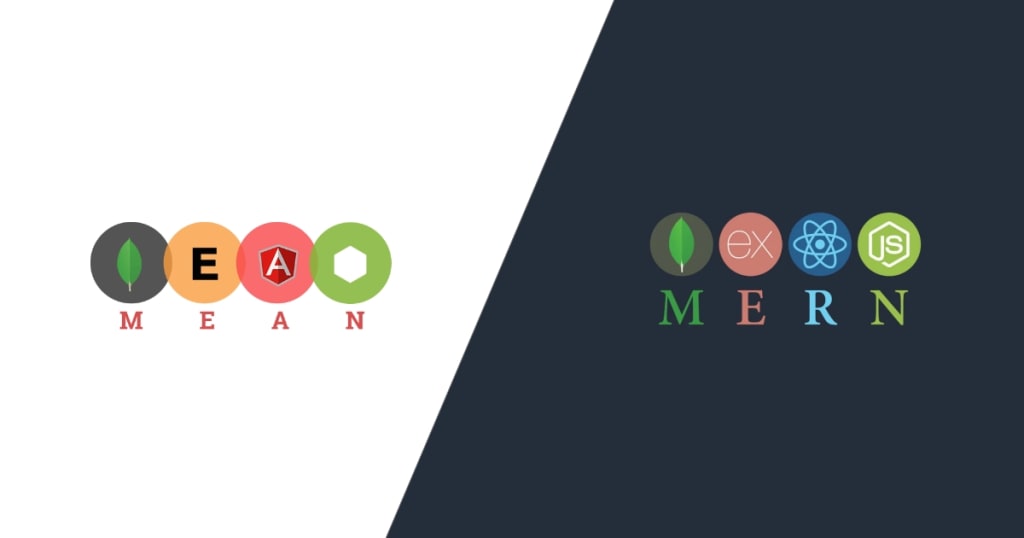MEAN vs. MERN Stack: Choosing the Right Full-Stack Web Development Arsenal
This blog explains the difference between MEAN vs MERN Stack

Technology stacks have been chosen in web development with dynamic technology changes that enable the development of reliable and scalable web applications. To the full-stack developer, this huge landscape could be very intimidating, especially to a fresh developer. Two of the most loved technologies are MEAN and MERN stacks consisting of JavaScript resources which are recognized for their productivity and simplicity. However, since these stacks inherently differ in the foundational constituents, it becomes quite significant for project success to identify which stack is most suitable. Here, the author compares MEAN and MERN stacks systematically, so that you’d know what to choose for your full-stack adventures.
Understanding Full-Stack Development:
To begin with, making it easy for a reader who might not have prior knowledge in MEAN and MERN, let’s set the pace. Full stack development touches on the application at two levels, the first is the user interface level that the users interact with and the second is at the server side where the application’s logic resides. Full-stack developers know both the client-side and the server-side development since they are involved with creating coherent web experiences.
Introducing the MEAN Stack:
The MEAN stack is a collection of four powerful JavaScript technologies:
MongoDB: It’s a NoSQL database that is very useful if you need a flexible and scalable approach to your data storage when working with large amounts of data of different types.
Express. js: A minimal web framework running on Node for building scalable applications with simplicity. js is significant as it serves as a strong base for the development of web applications and APIs.
Angular: From Google, a complete TypeScript-based framework for front-end pertaining to a rigid structure for developing large-scale single Page Applications (SPA).
Node. js: A free, network-tethered JavaScript interpreter that runs JavaScript code outside of a browser for applications requiring continuous active updates.
The Power of MEAN:
The combination of these technologies makes MEAN fore fronted one of the most preferred development stacks for umpteen web-related undertakings. Here's a glimpse into its strengths:
Rapid Development: Angular system has ready-made components and functions that help the developer to complete the project in a very short time as compared to other languages, to work on the key operations.
Scalability: MongoDB is a document store database with some characteristics from both key/value stores and object databases whereas Node. js are horizontally scalable, so when applications are used by more and more users, and when the amounts of data increase, MEAN is the best choice.
JavaScript Expertise: As all application aspects function on JavaScript, it is easy for programmers skilled in JavaScript to switch to MEAN stack since they will not require a lot of time to become familiar with the same.
Strong Community: Compared to other frameworks, MEAN has a large and engaged developer population which can be quite beneficial offering resources, steps, and other assistance.
Exploring MERN:
MERN stack is also similar to MEAN and the use of JavaScript at frontend, backend, database, and graphical user interface. However, it deviates in its front-end framework:
MongoDB: Carry over from MEAN for data persistence functionality.
Express. js: Continues to be the backbone of the concept in providing the back-end support.
React. js: A JavaScript framework, with component-based architecture for creating reusable user interface elements and with a system that helps to update the page and its elements faster and more efficiently – virtual DOM.
Node. js: Launches the applications and continues to act as the server-side platform.
Advantages of MERN:
MERN offers a distinct set of advantages for web development projects:
Flexibility: It is based on components in its implementation, which makes it easier to come up with more flexibility and reusable code, thus making it possible to deal with updates easily.
Performance: React utilizes virtual DOM (Document Object Model) that enables better and more efficient rendering of the user interface providing high fluidity for the most active interfaces.
Large Community: Like MEAN, React has a strong, growing community of developers who are always willing to help with any issues and explain any concepts.
SEO Friendliness: Thanks to its advanced features, React allows the optimization of applications and their subsequent organic search.
Beyond MEAN and MERN:
There are massive changes in the world of web development and new solutions emerge from time to time. Even though MEAN and MERN are as significant, people should also keep track of other developments like Vue. JavaScript (the somewhat related seminal front-end framework) and GraphQL
It can also be argued that for a full-stack engineer, a query language for the API is vital. The suggestions given above show that while knowledge of HTML, CSS, and JavaScript and the ability to learn are the two key requisites for this job, it is the willingness to learn that matters most.
Enhancing Your Full-Stack Development Journey:
Regardless of whether you choose MEAN or MERN, here are some valuable tips to elevate your full-stack development journey:
Master the Fundamentals: Reinforce your foundational knowledge of the JavaScript language, such as concepts like variables, data types, control structures, object-oriented programming, and the event loop for handling asynchronous code.
Embrace Learning: Skilled web development personnel are precious since the nature of the web development sector is changing every now and then. Set up a few hours every week to engage in reading and taking courses and tutorials and subscribe to industry journals such as full stack web development courses.
Build a Strong Portfolio: To demonstrate initiative and build your work portfolio, develop personal projects, or participate in open-source projects. Moreover, when we talk about perfecting your exe and job opportunities, having a well-curated portfolio adds value.
Practice Version Control: Continue the use of version control such as Git so as to track the changes made in the code, ensure coordination with team members, and perform a rollback if the need arises.
Join the Community: Ensure participation in online veterans’ forums to build connections with other developers, share information, and take insights from senior colleagues.
Conclusion:
Let us take a closer look into two stacks – MEAN and MERN – considered essential for full-stack developers. By knowing key attributes, one can get surprised as to what ought to be done or not to be done which projects to take, and what projects not to take depending on the situation. What I’d like to remind you is that the most important is still your passion in this field and your pursuit of learning exercises. By far and by large, it’s well worth getting yourself ready to jump into full-stack web development, provided you have what it takes to go through the rigorous process.
About the Creator
Fizza Jatniwala
Fizza Jatniwala, an MSC-IT postgraduate, serves as a dynamic Digital Marketing Executive at the prestigious Boston Institute of Analytics.
Enjoyed the story? Support the Creator.
Subscribe for free to receive all their stories in your feed. You could also pledge your support or give them a one-off tip, letting them know you appreciate their work.





Comments
There are no comments for this story
Be the first to respond and start the conversation.